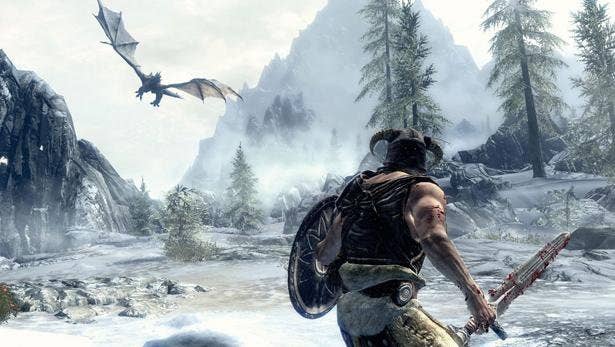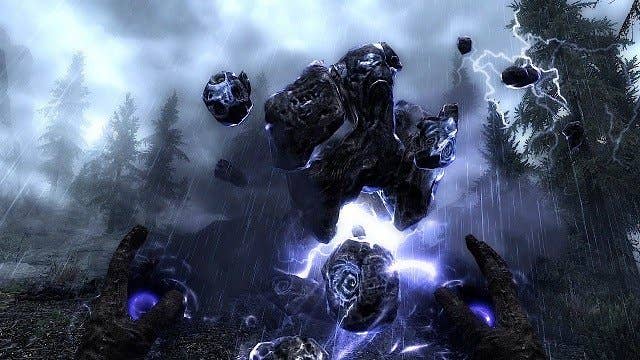Critical Consensus: The Elder Scrolls 5: Skyrim
Skyrim is another big, bold and buggy tour-de-force from Bethesda
Was there a gamer in the world in any doubt that The Elder Scrolls V: Skyrim would prove to be a good game? The consensus that Bethesda had another brilliant game to unleash upon its impatiently waiting public formed more quickly than any other release this year. Batman: Arkham City, Uncharted 3: Drake's Deception, Battlefield 3, Gears of War 3; the chance of any of these games being major disappointments was remote... but there was still a chance.
With Skyrim, however, the notion that Bethesda would do anything other than stride beyond its past achievements disappeared months ago. This shouldn't be dismissed as hype, or marketing, or the sheer will of Bethesda's vehement followers; rather, it speaks to the glaring flaws amid the general magnificence of Bethesda's back-catalogue.
Certainly, The Elder Scrolls and Fallout offer the sort of empowering, emergent adventure that cuts to the very heart of what makes videogames so affecting. But, as anyone who invested hundreds of hours into these sprawling worlds will tell you, this kind of ambition requires compromise. Blank-faced character models, endlessly reused voice-actors, cookie-cutter location design, and more fetch quests than even the most gallant knight could bear.
The most egregious of these many transgressions is Bethesda's tendency to save its weakest material for the main quest-line. In Oblivion and Fallout 3, at least, actually resolving the plot was more a matter of obligation than enjoyment, but, according to Giant Bomb's Brad Shoemaker, this is one of a gratifyingly broad range of disciplines that Bethesda has raised its game for Skyrim.

You play as the "Dragonborn" - a warrior, directly descended from dragons, and the first to arrive in the province of Skyrim in quite some time. Exactly what you're good at is decided as you play the game, but to the local residents you seem to have an uncanny knack for timing; after a long period of absence dragons have returned to Skyrim, terrorising towns and razing crops, and you are the only person who can stop them.
"That quest forms the backbone of Skyrim's core storyline, and it's a story well worth seeing through to the end, with genuine twists, intrigue, and momentum that drive it forward in a way Bethesda's past games really have," Shoemaker explains in his five-star review.
"I suspect Skyrim's story will prove more engaging [than Fallout 3 or Oblivion] for most players; I know it was for me. And in contrast to the disappointing finality of the last two Fallout games, the way Skyrim's main story "ends" is also wholly appropriate for a game as open and non-linear as this one."
A poor main quest-line would be enough to destroy the experience of most RPGs, but Bethesda's games could always fall back on breadth. There was so much ground to cover and so many locations to explore that satisfying missions could be found at any moment. Of course, Skyrim is no different, but Shoemaker is full of praise for the game's narrative texture, and the positive effect it has on the world's many revelations and distractions.
Skyrim builds up a rich and interesting narrative backdrop like no other game in recent memory
Brad Shoemaker, Giant Bomb
"Even if there were no dragons, Skyrim would be a chaotic place with a lot of social and political turmoil going on. There's a civil war brewing: between the Imperials (from the previous game's province of Cyrodiil), who want to keep a tight rein on the indigenous populace; and a growing band of rebels led by Ulfric Stormcloak, the would-be king of the Nords."
"There's tension between different races squeezed into cramped living quarters. There's religious oppression, ethnic displacement, feuding families, betrayal, and plenty of murder. Even Tamriel's mischievous demigods of all bad things, the Daedra, continue to meddle with mortal affairs whenever the notion strikes them."
"Maybe it's unfair to compare this to games that have a small fraction of the time to work with, but Skyrim builds up a rich and interesting narrative backdrop like no other game in recent memory."
It took Joystiq's Justin McIlroy 65 hours to reach the end of his first playthrough, but not only did he fail to complete the quests associated with the game's various factions, he also isn't sure he even met them all. When it comes to Skyrim, the concept of 'finishing' the game seems almost absurd.
"Bethesda has created one of the only games I can recall where the world is so steeped in 'stuff to do' it creates the illusion of a world completely without limit," he writes in another five-star review - it's safe to say there will be many of these.

"Its scope defies the very notion of "completion" as we've come to think of it relating to games."
However, while McIlroy dabbles in gushing praise - example: "This is the deepest, loveliest world ever created for a single player to explore, and one that no one should deny themselves." - he readily admits that Bethesda hasn't entirely ironed out the creases.
"While the stories and rewards are always different, there is a certain ... sameness that sets in with many of the missions. You'll notice a lot of people want a lot of specific items in caves or castles they're too chicken to explore. Keep in mind: I played a lot of missions in a short amount of time, so the repetition may not get to you. But a few more that required smarts over brawn would have been appreciated."
The persistent use of violent force to solve disputes is a common complaint in RPGs, but it comes down to a simple truth: inventing non-violent solutions is simply more difficult than letting the player slice somebody's arm off. The frustration can be alleviated somewhat by tight, satisfying combat mechanics, but while the game's "dual-wielding" approach to combat is a boon, Bethesda falters when it comes to melee.
